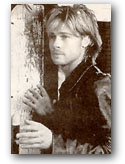

Badpuppy Gay Today |
Monday, 31 March, 1997 |

First, there's this film's ad poster near the marquee. One notices there's no co-equal female star. Co-starring, suddenly, no longer remains the romantic heterosexual draw it once was. Now its just handsome Brad on the poster with that earnest-faced other man, Harrison Ford; just Columbia Pictures hosting male co-stars. How will this double-male-tale be told, I wonder, and what pricklish nuances may I perhaps notice in its screen-land telling.
One tell-tale line, spoken in a fetching Irish brogue by Rory Devaney (Brad Pitt),allows that "This is not an American story. Its an Irish story." Well, its an American story too. Most of it takes place in New York City. Gordon Willis' photography expertly captures memorable moods that blanket gray-sky'd Manhattan.
Americans have it rough trying to understand--if any ever do-- the IRA's persistent uprisings against England. Pitt's IRA-bomberman (Rory) tells his American-policeman-house-host ( Tom O'Meara, played by Harrison Ford) that he doesn't expect anybody in America, really, to understand these turns and twists of a far-away struggle. Suffice it to say, Pitt's character, as a boy, had witnessed British operatives kill his father outright, not for anything his dad had done, but because he was merely suspected as an IRA sympathizer. Rory, as an adult, thus enters the continuing revengeful fray, becoming the most sought after of all IRA agents. The Devils Own moves swiftly, after a noisy Irish gun battle, from the Emerald Isle to New York. There, Rory attempts to live a quiet existence while arranging, with rich rebellion sympathizers, to send a shipload of missiles to Irish soil.
Brad Pitt's beauty has been used once again to highlight prime philosophic effects. His principled wildman personae, which developed admirably in Legends of the Fall (1995), continues along a dazzling route in The Devils Own, demonstrating Pitts' ability to reflect such arresting world-sorrow in his expressions. And, happily, Harrison Ford seems nearly as glad to see Brad as was this reviewer, but he expresses his joy, strangely, with a pointed but quite genitally-focussed thought. "Its good to have somebody in the house who pees standing up," he tells Brad, while his two young daughters swoon hopelessly over Brad's good looks. Ford's character-- a blue-collar cop--has got real character and so he can also see similar fine qualities in Brad. It takes one to know one. Nyet? In short, these two men know a profound respect for each other, a perfect starting place for the fast-moving tale that ensues, describing their principled entanglements.
Brad, of course, has a brief flirtation with a woman played by Natascha McElhone, and a fornication scene they accomplish is an exquisite Pitt-style-lesson in how to kiss or to touch a person's body. Even with all that, the New York Times' Janet Maslin dismisses McElhone's character as a generic girlfriend.
Scenes are well-structured, the plot moves pointedly, and a drama of two honest, caring intelligences unfolds. Though in close proximity, they arrive together from completely different dimensions. Tom's relationship with Rory could easily be tagged, as some tag it, "paternal." Tom is, after all, married and Rory is younger than he. But the passionate mutual appreciation these two men know stands beyond social labels, stemming from their recognition of those inner strengths we call character. It takes one to know one, in other words. "And no man understands any greatness or goodness but his own," sings a Leaves of Grass verse, "or the indication of his own." In a sense this acute recognition of each other that they share becomes a cause of a major undoing, however, an undoing best left unspoken about.
As in Legends of the Fall, Brad's lengthening hair impels this reviewer to whisper to him that most ineffective of all come-on lines, a line that always causes dismay in any local bar: "Your hair looks nice on you."
Rebel boy, that's Brad. He makes anarchists' dream movies, crafted political and philosophical artworks wherein life is lived completely and passionately in both its beauty and despair, outside of God's or man's laws, giving the finger to governments, to the military men, to politicians, to the police and, with subtlety, of course, to true-believers. "Did you drink beer in Ireland?" someone asks.
"I was baptized in it," Pitt's character replies.
As before, Brad is a transporter. In Legends it was bootleg. In The Devils Own, its missiles. He is also loving, fierce, yet very tender, junking all laws but his own. Through him, again, we see to-the-death personal loyalty amid principled brawling, a wrath both swift and unnerving erupting in response to grim injustice, things appreciated by the eyes of the soul.
© 1997 BEI;
All Rights Reserved. |